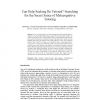Free Online Productivity Tools
i2Speak
i2Symbol
i2OCR
iTex2Img
iWeb2Print
iWeb2Shot
i2Type
iPdf2Split
iPdf2Merge
i2Bopomofo
i2Arabic
i2Style
i2Image
i2PDF
iLatex2Rtf
Sci2ools
107
click to vote
AIED
2007
Springer
2007
Springer
Can Help Seeking Be Tutored? Searching for the Secret Sauce of Metacognitive Tutoring
In our on-going endeavor to teach students better help-seeking skills we designed a three-pronged Help-Seeking Support Environment that includes (a) classroom instruction (b) a Self-Assessment Tutor, to help students evaluate their own need for help, and (c) an updated version of the Help Tutor, which provides feedback with respect to students’ help-seeking behavior, as they solve problems with the help of an ITS. In doing so, we attempt to offer a comprehensive helpseeking suite to support the knowledge, skills, and dispositions students need in order to become more effective help seekers. In a classroom evaluation, we found that the Help-Seeking Support Environment was successful in improving students’ declarative help-seeking knowledge, but did not improve students’ learning at the domain level or their help-seeking behavior in a paper-and-pencil environment. We raise a number of hypotheses in an attempt to explain these results. We question the current focus of metacognitive ...
AIED 2007 | Artificial Intelligence | Effective Help Seekers | Help-seeking Behavior | Help-Seeking Support Environment |
| Added | 07 Jun 2010 |
| Updated | 07 Jun 2010 |
| Type | Conference |
| Year | 2007 |
| Where | AIED |
| Authors | Ido Roll, Vincent Aleven, Bruce M. McLaren, Kenneth R. Koedinger |
Comments (0)

